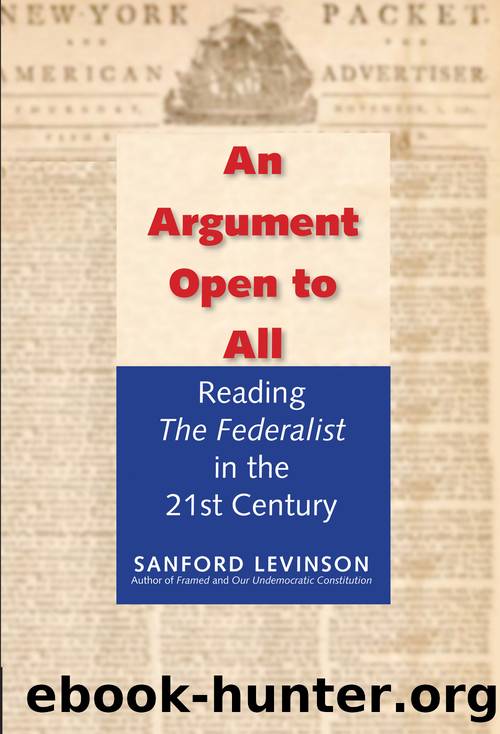An Argument Open to All by Levinson Sanford

Author:Levinson, Sanford
Language: eng
Format: epub
Publisher: Yale University Press
Published: 2015-06-15T00:00:00+00:00
FEDERALIST 47
Is âSeparation of Powersâ a Helpful Maxim?
FEDERALIST 47 IS SURELY one of the better known of the eighty-five essays, largely because it, together with Federalist 51, offers the fullest explication of a term dear to the hearts of Americans: âseparation of powers.â Analytically, one can easily distinguish the creation of new law from the execution of the law; and both of these from the interpretation of laws to resolve ambiguities in meaning. The question is whether these different activities should be assigned to different persons or departments. There is no logical necessity to do so, but it is often argued that these three roles should not be entrusted to the same individuals but distributed into separate institutions that we have learned to label the âlegislature,â âexecutive,â and âjudiciary.â The question that arose during the debate over ratification, and to which Publius responds in this essay, is whether the three branches of government are sufficiently separate to comply with what he describes as the âpolitical maxim, that the legislative, executive, and judiciary departments ought to be separate and distinct.â
Ever the clever rhetorician, Publius agrees that this maxim has great âintrinsic value,â not least because it âis stamped with the authority of ⦠enlightened patrons of liberty.â He offers his own paraphrase: âThe accumulation of all powers, legislative, executive, and judiciary, in the same hands, whether of one, a few, or many, and whether hereditary, self-appointed, or elective, may justly be pronounced the very definition of tyrannyâ (emphasis added). A great deal of work is done by the word âall,â for its function in the rest of his argument is to assertâaltogether cogently, I might addâthat although the system of government instantiated in the Constitution features some important overlaps of political powers and functions, it does not threaten to become tyrannical precisely because the blending is only partial.
It is useful to contrast the United States Constitution with the text of the Massachusetts constitution of 1780, drafted in substantial measure by John Adams: âIn the government of this Commonwealth, the legislative department shall never exercise the executive and judicial powers, or either of them: The executive shall never exercise the legislative and judicial powers, or either of them: The judicial shall never exercise the legislative and executive powers, or either of them: to the end it may be a government of laws, and not of men.â Similar language can be found in the constitutions of Maryland, Virginia, North Carolina, and Georgia. All seemingly require extensive formal definition of what distinguishes âthe legislative, executive, and judicial powersâ in order to prevent any branch from exercising even an iota of the powers assigned elsewhere. But Publius tells us that such fastidious separation is a mistake that is fortunately absent from the United States Constitution.
Although the United States Constitution, at the beginnings of Articles I, II, and III, refers to the three powers by name, it contains nothing comparable to the specific language of the Massachusetts text, and it is crystal clear that there is indeed overlap.
Download
This site does not store any files on its server. We only index and link to content provided by other sites. Please contact the content providers to delete copyright contents if any and email us, we'll remove relevant links or contents immediately.
| Civil Rights | Discrimination |
| General | Human Rights |
Day by Elie Wiesel(2786)
The Age of Genius by A. C. Grayling(2592)
Gideon's Spies: The Secret History of the Mossad by Gordon Thomas(2355)
The Gulag Archipelago (Vintage Classics) by Aleksandr Solzhenitsyn(2106)
FATWA: Hunted in America by Pamela Geller(2013)
Columbine by Dave Cullen(1870)
Men Explain Things to Me by Rebecca Solnit(1729)
The Rule of Law by Bingham Tom(1701)
Anatomy of Injustice by Raymond Bonner(1671)
Examples & Explanations: Administrative Law by William F. Funk & Richard H. Seamon(1649)
Three Cups of Tea by Greg Mortenson(1620)
The Source by James A. Michener(1618)
That Every Man Be Armed by Stephen P. Halbrook(1584)
ADHD on Trial by Michael Gordon(1581)
Future Design by Unknown(1580)
Gideon's Spies by Gordon Thomas(1512)
Palestinian Walks by Raja Shehadeh(1499)
Constitutional Theory by Carl Schmitt(1458)
Nothing to Envy by Barbara Demick(1451)
